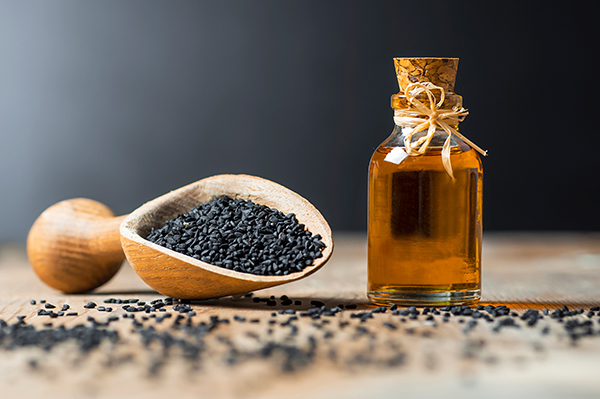 Parler
Parler Gab
Gab
 3. Lead
Heavy metals are widely distributed in the environment and some of them occur in food, water, air and tissues even in the absence of occupational exposure. Among these lead, is a known hazardous substance to human and animals.
Lead is believed to be one of the top sources of toxicity worldwide. Routes of exposure to lead include contaminated air, water, soil, food, and consumer products. Lead interferes with a variety of body processes and is toxic to many organs and tissues including the heart, bones, intestines, kidneys, and reproductive and nervous systems. Black seed oil has been found to be protective against a number of different lead induced toxic effects.
Brain Toxicity [iii]
The mad hatter from Alice and Wonderland may well have suffered from lead acetate-induced brain damage, could there be a solution to this malady? A recent study co-administered black seed oil component thymoquinone with lead acetate and found a markedly decreased the incidence of lead acetate-induced pathological brain lesions in rats receiving the black seed oil extract. This study indicates a likely beneficial effect of thymoquinone against neurotoxic effects of lead.
Reproductive Toxicity [iv]
Lead is also known to cause oxidative stress in testicles. A study examining the effect of the major active ingredient of volatile oil of black seed oil, thymoquinone, against lead-induced testicular oxidative stress found thymoquinone supplementation completely reversed these biochemical changes caused by lead. The study concluded that 5 weeks of thymoquinone supplementation is very efficient in preventing lead-induced testicular oxidative stress.
Liver and Kidney Toxicity [v]
As the liver and kidneys are exposed to most of what comes into our bodies they are vulnerable to damage from those very substances.
A study was carried out to investigate the possible protective effect of co-administered Nigella sativa seeds on lead acetate-induced liver and kidney toxicity in rats. One group received a diet containing lead acetate for six weeks and the other was fed the same basal diet with Nigella sativa added.
The results of this study revealed that lead acetate caused significant derangement in liver enzymes and additionally histopathological observations showed severe structural damage in the liver and kidneys. Combined treatment of lead-exposed animals with Nigella sativa showed marked improvement in both biochemical and histopathological findings as well as reduction in the damaged areas. These experimental results strongly indicate the protective effect of Nigella sativa against toxic effect of lead on liver and kidney tissues.
4. N-Nitrosodimethylamine
N-Nitrosodimethylamine is an organic chemical, produced as by-product of several industrial processes and present in low levels in certain foodstuffs, especially those cooked, smoked, or cured. N-Nitrosodimethylamine is highly toxic to the liver and may cause hepatocellular carcinoma (liver cancer).
A study [vi] was conducted which examined the effect of black seed oil extract thymoquinone on liver cancer induced by N-Nitrosodimethylamine. The results showed that thymoquinone significantly reduced the detrimental alterations by reducing abnormal cell proliferation. The results showed thymoquinone has potent anti proliferative activity, which may indicate a beneficial role in the treatment of liver cancer.
5. Diesel exhaust particles
Diesel combustion exhaust is a source of contaminants including atmospheric soot and fine particles implicated in human cancer, heart and lung damage as well as mental dysfunction.
A study [vii] was conducted to examine the effects of black seed oil extract thymoquinone on the damaging effects of diesel exhaust particles caused to the heart and lungs.
After 18 hours of diesel combustion exhaust particle exposure a significant reduction in pulmonary and cardiovascular functions in rats was noted. It was also noted that clot formation became much more likely. Pre-treatment with thymoquinone prevented the cardiovascular effects caused by diesel combustion exhaust particle exposure. Thymoquinone also prevented the clotting abnormalities caused by diesel exhaust particles.
The five studies we have examined have confirmed the powerful protective effects of black seed oil and its active extract thymoquinone. The antioxidant properties of black seed oil are well recognized and its potential application in protecting us against the myriad of substances we are exposed to daily is becoming ever more evident.
In part two we will examine the effects of black seed oil on another 5 potentially toxic substances.
View additional information on black seed review literature at the Greenmedinfo.com Nigella sativa research database.
Read more at: GreenMedInfo.com
3. Lead
Heavy metals are widely distributed in the environment and some of them occur in food, water, air and tissues even in the absence of occupational exposure. Among these lead, is a known hazardous substance to human and animals.
Lead is believed to be one of the top sources of toxicity worldwide. Routes of exposure to lead include contaminated air, water, soil, food, and consumer products. Lead interferes with a variety of body processes and is toxic to many organs and tissues including the heart, bones, intestines, kidneys, and reproductive and nervous systems. Black seed oil has been found to be protective against a number of different lead induced toxic effects.
Brain Toxicity [iii]
The mad hatter from Alice and Wonderland may well have suffered from lead acetate-induced brain damage, could there be a solution to this malady? A recent study co-administered black seed oil component thymoquinone with lead acetate and found a markedly decreased the incidence of lead acetate-induced pathological brain lesions in rats receiving the black seed oil extract. This study indicates a likely beneficial effect of thymoquinone against neurotoxic effects of lead.
Reproductive Toxicity [iv]
Lead is also known to cause oxidative stress in testicles. A study examining the effect of the major active ingredient of volatile oil of black seed oil, thymoquinone, against lead-induced testicular oxidative stress found thymoquinone supplementation completely reversed these biochemical changes caused by lead. The study concluded that 5 weeks of thymoquinone supplementation is very efficient in preventing lead-induced testicular oxidative stress.
Liver and Kidney Toxicity [v]
As the liver and kidneys are exposed to most of what comes into our bodies they are vulnerable to damage from those very substances.
A study was carried out to investigate the possible protective effect of co-administered Nigella sativa seeds on lead acetate-induced liver and kidney toxicity in rats. One group received a diet containing lead acetate for six weeks and the other was fed the same basal diet with Nigella sativa added.
The results of this study revealed that lead acetate caused significant derangement in liver enzymes and additionally histopathological observations showed severe structural damage in the liver and kidneys. Combined treatment of lead-exposed animals with Nigella sativa showed marked improvement in both biochemical and histopathological findings as well as reduction in the damaged areas. These experimental results strongly indicate the protective effect of Nigella sativa against toxic effect of lead on liver and kidney tissues.
4. N-Nitrosodimethylamine
N-Nitrosodimethylamine is an organic chemical, produced as by-product of several industrial processes and present in low levels in certain foodstuffs, especially those cooked, smoked, or cured. N-Nitrosodimethylamine is highly toxic to the liver and may cause hepatocellular carcinoma (liver cancer).
A study [vi] was conducted which examined the effect of black seed oil extract thymoquinone on liver cancer induced by N-Nitrosodimethylamine. The results showed that thymoquinone significantly reduced the detrimental alterations by reducing abnormal cell proliferation. The results showed thymoquinone has potent anti proliferative activity, which may indicate a beneficial role in the treatment of liver cancer.
5. Diesel exhaust particles
Diesel combustion exhaust is a source of contaminants including atmospheric soot and fine particles implicated in human cancer, heart and lung damage as well as mental dysfunction.
A study [vii] was conducted to examine the effects of black seed oil extract thymoquinone on the damaging effects of diesel exhaust particles caused to the heart and lungs.
After 18 hours of diesel combustion exhaust particle exposure a significant reduction in pulmonary and cardiovascular functions in rats was noted. It was also noted that clot formation became much more likely. Pre-treatment with thymoquinone prevented the cardiovascular effects caused by diesel combustion exhaust particle exposure. Thymoquinone also prevented the clotting abnormalities caused by diesel exhaust particles.
The five studies we have examined have confirmed the powerful protective effects of black seed oil and its active extract thymoquinone. The antioxidant properties of black seed oil are well recognized and its potential application in protecting us against the myriad of substances we are exposed to daily is becoming ever more evident.
In part two we will examine the effects of black seed oil on another 5 potentially toxic substances.
View additional information on black seed review literature at the Greenmedinfo.com Nigella sativa research database.
Read more at: GreenMedInfo.com
Lavender is effective against drug resistant staph infection
By News Editors // Share
Government report links fluoride intake to lowered IQ in children
By Ethan Huff // Share
RFK Jr. suspends campaign with singular focus: Ending childhood illness epidemic
By News Editors // Share
RFK Jr. suspends presidential campaign, will join forces with Trump to ‘save millions of children’
By News Editors // Share
Reports claim that climate change gods are “displeased” as Ancient Mayan Temple collapses in Mexico
By Lance D Johnson // Share
Governments continue to obscure COVID-19 vaccine data amid rising concerns over excess deaths
By patricklewis // Share
Tech giant Microsoft backs EXTINCTION with its support of carbon capture programs
By ramontomeydw // Share
Germany to resume arms exports to Israel despite repeated ceasefire violations
By isabelle // Share










